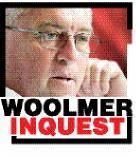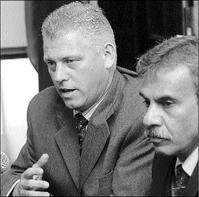Howard Campbell, Sunday Gleaner Writer

Deputy Commissioner of Police Mark Shields and a senior Pakistani detective update the media about the Bob Woolmer investigation at the Police Officers Club on April 27, 2007. Shield testified last week at the inquest into Woolmer's death that he was not murdered. - Rudolph Brown/Chief Photographer
Last week marked the fourth week in the coroner's inquest into the death of Pakistan cricket coach Bob Woolmer. The 58-year-old former England player's nude, motionless body was found by staff at The Jamaica Pegasus hotel on the morning of March 18. He was pronounced dead later that day at the University Hospital of the West Indies.
In March, government pathologist Dr. Ere Seshaiah gave asphyxia caused by manual strangulation as the cause of death. But during his testimony at the inquest, he changed that to asphyxia caused by manual strangulation associated with cypermethrin poisoning. He said he saw traces of the pesticide after viewing the toxicology report on June 21.
On June 12, then Police Commissioner, Lucius Thomas, said the toxicology report revealed no foreign substance in Woolmer's body.
At least three foreign pathologists said Woolmer was not murdered. They theorise he died from natural causes.
Here's a look at some of what took place last week in the inquest at the Jamaica Conference Centre, downtown Kingston.
November 12 (Day 19): Professor Tara Dasgupta, a senior member of the Pesticide Research Laboratory at the University of the West Indies, testified that new tests done November 10 on samples from Pakistan coach Bob Woolmer, revealed no trace of the pesticide cypermethrin.
Prof. Dasgupta also questioned the analysis of Fitzmore Coates, acting chief forensic officer at the Government Forensic Science Laboratory in Kingston, who testified November 8, that there was enough cypermethrin in the 58-year-old Woolmer's system to kill him.
"I found his data very puzzling and his analysis was not proper," Prof. Dasgupta said.
Steve Ashman, travelling liaison officer with the Pakistan team for the Cricket World Cup, also testified. He came under pressure from Director of Public Prosecutions (DPP) Kent Pantry on the movement of the team on March 12, the day a janitor said she saw Woolmer in the company of an Asian man at Sabina Park, counting a substantial amount of United States currency.
Ashman said the Pakistanis practised at Kensington Park in east Kingston that day, not at Sabina Park. But in four statements to the police, he said Pakistan were at Sabina Park on March 12.
November 13 (Day 20): Deputy Commissioner of Police, Mark Shields, who led local investigations into the Woolmer case, takes the stand. He tells the court that the International Cricket Council's Anti-Corruption and Security Unit had ruled out any link of match-fixing on the sub-continent to Woolmer's death.
Shields also said that during a trip to the coach's Cape Town, South Africa, home in May, he spoke to Woolmer's family and friends who told him that Woolmer was writing a book on cricket. It had nothing to do with match-fixing, but the technical side of the game, Shields said.
November 14 (Day 21): DCP Shields is again on the stand. He defends the police's decision to declare the Woolmer case closed on June 12, saying their stance came after assurance that he had not been murdered.
He also comments on the credibility of Abdul Sattar, a friend of the Pakistan team, who was in Kingston for their matches.
Sattar, a Pakistan national national who lives in London, gave a statement to British police that he left here March 15 to be with his ailing mother-in-law, who subsequently died. He said he learned of Woolmer's death while at an airport in Dubai, en route to Pakistan, to identify a burial site for his mother-in-law.
Shields said he spoke to Sattar on Wednesday morning about him coming to Kingston to testify for the inquest. He declined, as did other members of the Pakistan party, including former captain Inzaman ul-Haq.
November 15 (Day 22): For the third straight day, Shields is questioned.
During his testimony, he said the police, after a thorough investigation, are certain Woolmer was not murdered.
He also tells Dirk Harrison from the office of the Director of Public Prosecutions that the Government Forensic Science Laboratory in Kingston is not up to international standard.
It was at this lab that forensic analysts Marcia Dunbar and Fitzmore Coates said they found cypermethrin in Woolmer's system. Dunbar testified that a container with one of the samples may have been contaminated.
Friday, November 16 (Day 23): Shields, in his fourth straight day of testimony, said his team gave full cooperation to the office of the DPP throughout the investigation into Woolmer's death.
But the DPP's Dirk Harrison challenged this. He pointed out that the DPP office was not involved, by the police, in two important aspects of the case.
Harrison said reports from pathologists Dr. Nathaniel Cary of England, Michael Pollanen of Canada and the South African Lorna Jean Martin, were published in the press before reaching the DPP. He also said the DPP was not consulted by the police before they declared the case closed on June 14.
Shields said he did not know how the reports appeared in The Gleaner before their official release.
"I can't say if the leak came from the Jamaica Constabulary Force, but I can say circulation of the report was extremely limited," he said.

